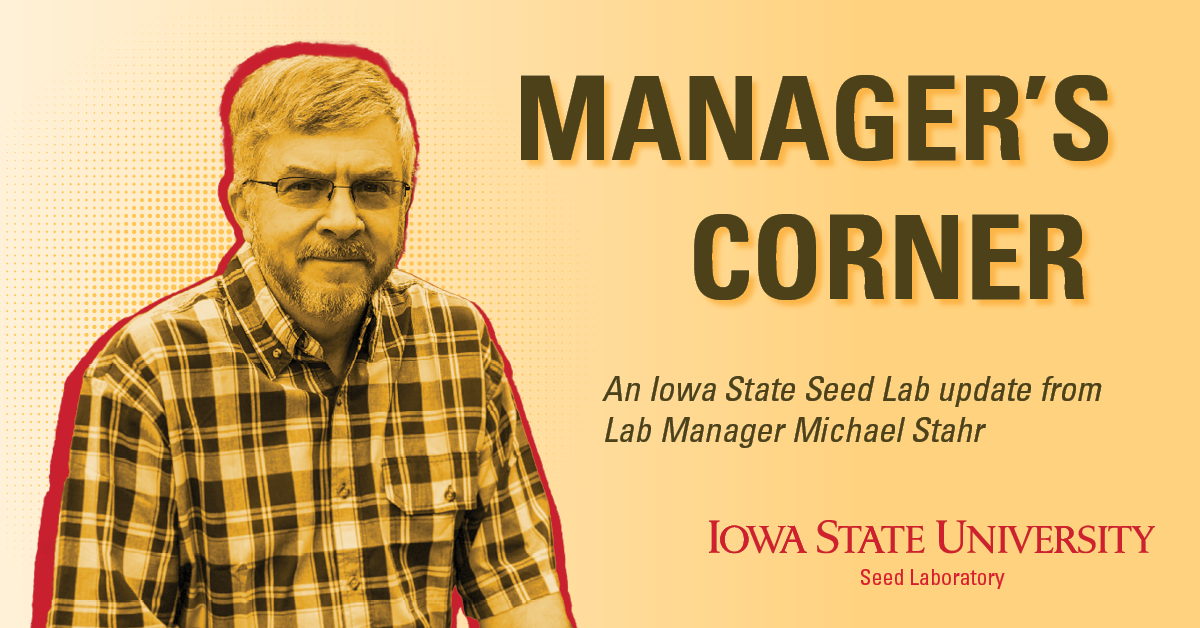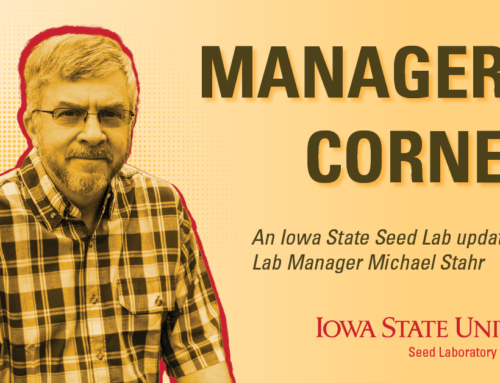I think all of us have perfected our coping skills after about 20 months of dealing with the many effects of COVID. Not only doing our best to avoid COVID, but also to deal with shortages of items and of labor. Farmers and ranchers are feeling the effects of more than COVID: skyrocketing fertilizer prices, shortages of propane, increasing costs of other inputs and so on. Because of the critical nature of seed testing, I believe it is one of the best “buys” in agriculture. Basic testing, such as the standard (warm) germination test, costs less than $20 per sample for some species at a number of labs. Even more expensive tests, such as PCR testing for pathogens or biotech traits, are relatively cheap considering their critical nature and the requirements of expertise and high tech equipment.
Members of AOSA (Association of Official Seed Analysts – of which the ISU Seed Lab is a member lab), SCST (Society of Commercial Seed Technologists – of which the ISU Seed Lab has four Registered or Certified individual members) and ISTA (International Seed Testing Association) have been cooperating to improve seed testing procedures and to add additional species to the AOSA and the ISTA Rules for testing seeds. How are you at acronyms? AOSA, SCST, ISTA, ASTA, AASCO, AOSCA, USDA, CFIA and other organizations are working together to improve the uniformity of testing results, within and between seed labs. In the last year AOSA and SCST made significant process identifying a number of changes – increased availability of training, working to standardize reports of analysis, making changes to the AOSA Rules for Testing Seeds, and more.
The ISU Seed Lab and the Seed Science Center (SSC) are key players in seed testing, research, training worldwide and being active in and with many seed-related organizations. The National Seed Health System (NSHS) was developed with significant input from former SSC seed pathologist Dr. Denis McGee. Improvement in seed health testing methods and addition of entities certified under the NSHS system involve Seed Lab and SSC personnel. Seed Lab staff have served on many committees and boards plus have provided leadership in a number of organizations (AOSA, SCST, ASTA, APA, to mention a few). We love seeds and we love contributing to improvements for farmers, gardeners, seed companies, Seed Lab customers and many others.
After a prudent period of not offering in-person workshops since 2020 (we last offered training in late January and early February 2020), dates have been set for Purity and Germination workshops. A beginner Purity workshop is set for April 18-21, a Germination workshop for April 25-28 and an advanced Purity workshop for May 2-5. Plans are to host the AOSA SCST Consolidated Exams on Fridays during two of those weeks. Registration for the workshops should be available soon. Please go to www.seedlab.iastate.edu/training for information on training in seed testing and seed conditioning training or for the SSC’s unique on-line Master’s degree in seed technology and in business (STB).
Despite the drought that hampered crops in much of the central and western U.S. last summer we are seeing signs of disease issues in some soybean seed lots. A rainy and/or foggy late summer and early fall can encourage Phomopsis to move from pods of soybean plants to seeds. Next spring might see continued dry conditions in the Midwest or it could be cold and wet. The ISU Seed Lab offers various vigor tests (cold, saturated cold, accelerated aging, cool, etc.) that provide useful information for seed going into less than favorable conditions. The standard (warm) germination test gives an indication of emergence in better conditions.
Best wishes for the remainder of 2021 and for 2022! Be safe!
—Mike Stahr, ISU Seed Lab Manager


